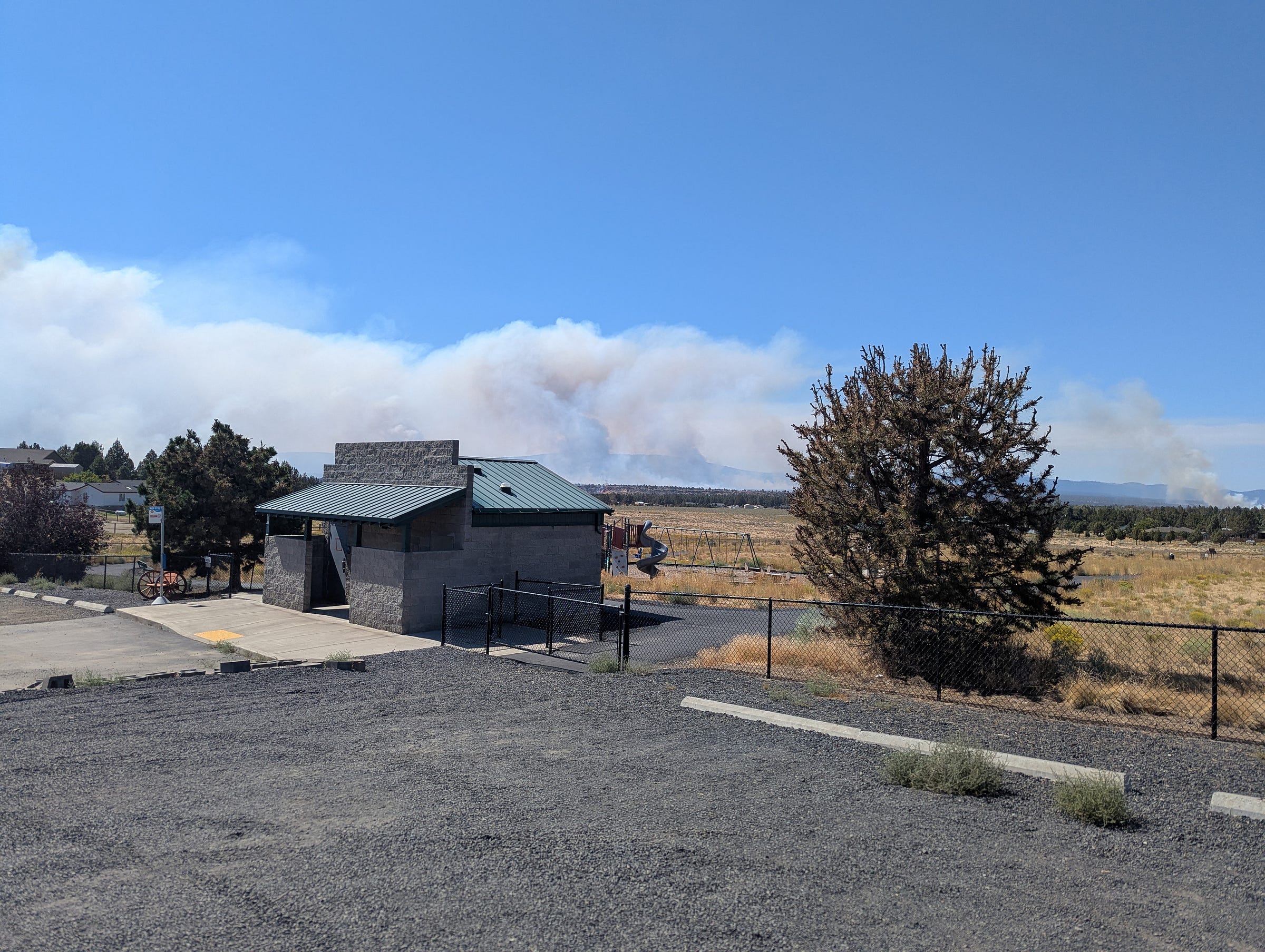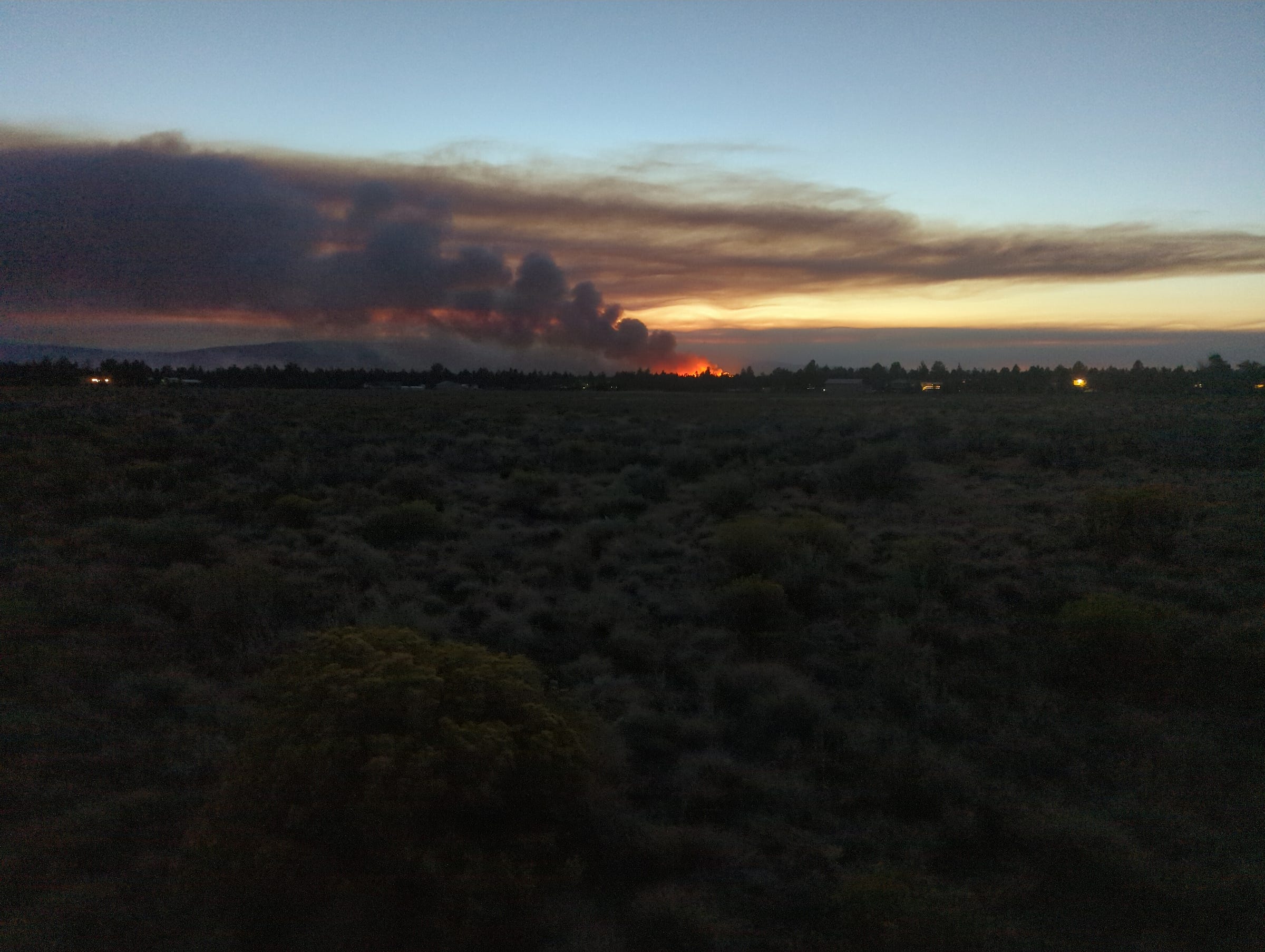Number 18: Be calm when the unthinkable arrives
The annoying necessity of growing into a better person does not cease because fascists have come onto the stage.
This week continues a series inspired by Tim Snyder’s 2017 book On Tyranny and the “20 Lessons” derived from his study.
Number 18: Be calm when the unthinkable arrives. Modern tyranny is terror management. When the terrorist attack comes, remember that authoritarians exploit such events in order to consolidate power. Do not fall for it.
There was not much smoke in the air when I turned onto my road, but the horizon was a battlefield with four distinct plumes of smoke rising over a low cloud that stretched over nearly 180 degrees of the horizon. I pulled over at the well-named Panorama Park to get a feel for what we were facing. Other neighbors were sitting in their trucks watching the plumes rise and the planes coming over.
The Flat Fire1 grew to 3,000 acres in its first 12 hours. The next evening it was a 7,000 acre long pink stain on our Watch Duty2 app screens, running parallel to the river a few miles West of us. Its outline wrapped around the grey ghost of the fire we stared at earlier this year.
I watched a red pillow of retardant drop from the belly of a plane. I reckoned it was around the convergence of Wychus Creek and the Deschutes. Four smaller planes dangling pontoons flew in formation all afternoon, scooping water from a nearby reservoir and dumping it along the fire lines.
Evacuations are levels 1-3: 1 Get Ready, 2 Get Set, 3 Go Now.
My house is under level 2 Get Set.
Get Set. Brace yourself. Get the juices flowing. Fight or flight. Ask yourself “am I up for this?” Narrow your thoughts to a focus. Eliminate the peripheral. Stress yourself.
Sarah called. She works wildland fires. Her friend Greg was with her. She was actively working to calm me, which I found annoying. I did not believe that I required calming. She knew otherwise. She wanted me to be effective, to stay safe. She knows how I can be.
Greg yelled into the phone. I couldn't make it out.
"What was that?"
She replied in a measured, clear cadence, "He said slow is smooth, smooth is fast."
I had never heard that phrase. Thanks to Internet Classic3 I looked it up.
Turns out it is a term used in US military training to underline that effective soldiers to keep their cool. They don't do risky things. I pictured a plumber that I recently watched work. He moved steadily, considered. He accomplished the task faster and better than I would with nervous, fervent energy.
Turns out that scholars and craftsmen of the Renaissance adopted this tenet, such as Erasmus and Aldus Manitus.
Turns out they were inspired by the first emperor of Rome, Augustus. He said he preferred a safe commander to a bold one and "that which has been done well has been done quickly enough."
Turns out his phrase, which he minted onto coins, was taught to him by his Stoic teachers:
Festina lente4
Make haste, slowly. (The word "haste" has a meaning frequently used nowadays of shoddiness that is not in keeping with this translation. If you can't read haste as "effectively moving quickly,” read Augustus motto as "make rapid progress, slowly.")
In the sixth century BCE, it turns out, a storyteller invoked a fictional tale of a race between a tortoise and a hare to demonstrate that we achieve more with our slow thinking brains than our rapid response brains.5
Festina lente.
When the unthinkable arrives, find your calm. Think broadly, work singularly. Consider a bit upon any calls for urgency, even from those you trust. They are responding to tyranny's terror the way that tyranny wants us to.
Pack your bag thoughtfully. Notice what your neighbors are doing. Be present. Help others to slow down and move faster.
At nightfall, the smoke columns reflected the orange of the burning junipers and sage below. We are waiting to see if the wind will change. We are packing our bags, collecting what is important. Noting the routes the planes take over the neighborhood.
The retardant to dump upon tyranny and terror is ages-old. It is baked into your psyche. You use it all the time. We are here with you. You can recall, despite the alarms and smoke, of what is important and how to preserve it.
Evening of August 22
Morning of August 23
The app that those in fire country rely upon for updates and notifications. https://app.watchduty.org
Daniel Kahneman's 2011 book Thinking, Fast and Slow sought to demonstrate that we have two ways of using our brains, the slow and fast. Note that along with a lot of social science, research in the book has been questioned as part of the replication crisis. I believe that does not entirely undermine the ideas of the book.






Wishing you all safety, clean lungs and for us to have a climate plan.
Well said. I will remember festina lente.